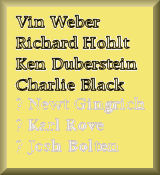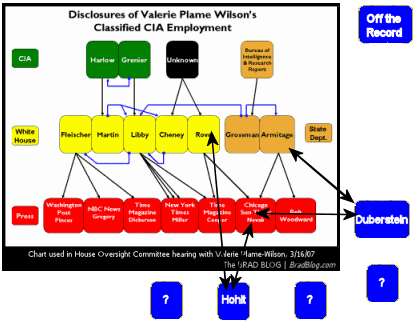 There’s no brass plaque on the various restaurants where Richard Hohlt‘s Off the Record Club meets periodically for food and a chance to chat and rant with each other over a nice meal. According to Michael Isakoff, the only known rule is that the meetings stay off the record. They’re just a group of very heavy hitting Republican lobbyists, former government officials who get together for dinner, occasionally joined by current Republican Staffers. In a small Southern town, it would be called a good old boy network in every sense of the phrase. Of the known members, Vin Weber is the most obviously political member – a former Minnessota Congressman, Newt’s best buddy back then. He left Congress and spent the Clinton years building a powerful lobbying business and was a signee of the P.N.A.C. letter to Cinton in 1998. Charles Black, like Weber is involved as a political strategist in Republican campaigns and a big fan of Tom Delay. Richard Hohlt is a big money raiser with connections to the Press, particularly Robert Novak. Ken Duberstein is another Washington Lobbyist – a Republican operative who has been a part of the inner circle of Bush Political Stategists working closely with Karl Rove. Apparently, the meeting Richard Armitage had with Robert Novak on July 8th was set up by Armitage as a favor to Duberstein, in turn as a favor he was doing for Powell, though it’s not clear Novak knew that. All are connected with the Republican Presidential campaigns as advisor’s. They started meeting around the time Clinton got elected.
There’s no brass plaque on the various restaurants where Richard Hohlt‘s Off the Record Club meets periodically for food and a chance to chat and rant with each other over a nice meal. According to Michael Isakoff, the only known rule is that the meetings stay off the record. They’re just a group of very heavy hitting Republican lobbyists, former government officials who get together for dinner, occasionally joined by current Republican Staffers. In a small Southern town, it would be called a good old boy network in every sense of the phrase. Of the known members, Vin Weber is the most obviously political member – a former Minnessota Congressman, Newt’s best buddy back then. He left Congress and spent the Clinton years building a powerful lobbying business and was a signee of the P.N.A.C. letter to Cinton in 1998. Charles Black, like Weber is involved as a political strategist in Republican campaigns and a big fan of Tom Delay. Richard Hohlt is a big money raiser with connections to the Press, particularly Robert Novak. Ken Duberstein is another Washington Lobbyist – a Republican operative who has been a part of the inner circle of Bush Political Stategists working closely with Karl Rove. Apparently, the meeting Richard Armitage had with Robert Novak on July 8th was set up by Armitage as a favor to Duberstein, in turn as a favor he was doing for Powell, though it’s not clear Novak knew that. All are connected with the Republican Presidential campaigns as advisor’s. They started meeting around the time Clinton got elected.
So how did the Off the Record Club make it on the record? At the end of his testimony in the Libby Trial, Novak was asked by one of Libby’s lawyers who else he spoke to about the story. He mentioned his friend, Richard Hohlt, one of his daily contacts. When Hohlt learned that Novak was onto this story, he emailed Karl Rove. When the story was finished, Novak gave Hohlt a copy. He alerted Rove immediately, and faxed him the whole article, three days before it came out. But he was not the only Off the Record Club member who became a player in the story. According to Elizabeth De La Varga, Ken Duberstein is a friend and advisor to Richard Armitage [and Colin Powell]. Recall Robert Novak’s testimony in the Libby Trial that he’d been trying to meet with Richard Armitage for several years, but had been directly rebuffed. Then, "out of the blue," he got a call from Armitage [around June 22nd to set up a meeting for July 8th, the meeting where Plame was "outed." Apparently the meeting was brokered by Ken Duberstein. Duberstein later apparently said that he "may have" arranged the Armitage/Novak meeting as a favor to Colin Powell. Duberstein continued to advise Armitage and may have been involved in getting him his post-Administration job.
One of the reasons to focus on all this shadowy business is that Armitage and Noval present very different views of their meeting. Armitage says he mentioned Plame in passing at the end of their meeting. Novak tells a different story:
First, Armitage did not, as he now indicates, merely pass on something he had heard and that he ‘‘thought’’ might be so. Rather, he identified to me the CIA division where Mrs. Wilson worked, and said flatly that she recommended the mission to Niger by her husband, former Amb. Joseph Wilson.
Second, Armitage did not slip me this information as idle chitchat, as he now suggests. He made clear he considered it especially suited for my column.
….As for his current implications that he never expected this to be published, he noted that the story of Mrs. Wilson’s role fit the style of the old Evans-Novak column — implying to me it continued reporting Washington inside information.
And who called Novak when Armitage wanted to find out if he was the "source?" Kenneth Duberstein. The story that Armitage is just a gossip never held much water. He tells Bob Woodward about Plame on June 13th, 2007 "out of the blue" and calls in Robert Novak "out of the blue" a week or so later and brings it up to Novak. Then he’s shocked to find out he’s the "source?" Excuse me, but that sounds like Libby’s "surprise" about relearning about Plame anew from Tim Russert.
The Summer of 2003 wasn’t going so well for the Bush Administration. They’d fudged the intelligence to get us into war with Iraq, gambling that they’d find enough stuff to justify their prewar claims, and the evidence just wasn’t there. And they were beginning to put together the political strategizing for the upcoming 2004 Presidential election. Rove and his Republican allies [including the boys from the Off the Record Club] were thinking about getting Bush re-elected. In the midst of all of this, there were articles and phone calls from another shadow that said that some former ambassador was going around town questioning their prewar campaign to go to war. This wouldn’t look so good, period, but would look especially bad in the coming election plan. So when someone [say Karl Rove for the purposes of argument] found out about Joseph Wilson and his wife’s employment at the C.I.A., maybe a plan was hatched to head Wilson off at the pass, working with people who weren’t in the Administration [people like the guys in the Off the Record Club for example] something like a strong, covert, unilateral, pre-emptive strike [like, for example, the Bush Doctrine].So, Ken Duberstein works with Richard Armitage to set up a leak to Bob Woodward and Robert Novak. But then Joseph Wilson breaks the rules and publishes his Oped before this pre-emptive strike bears any fruit – so all the later stuff [Miller, Cooper, etc.] was a damage control plan because the pre-emptive strike got interrupted on July 6th by Wilson’s article. While Duberstein was working Armitage, Richard Hohlt was working the Robert Novak side of the equation and reporting in to Karl Rove.
 What would such a theory explain? First, where is Karl Rove in all of this. He’s got to be somewhere. This theory would have him off pulling strings in the background. That is definitely his M.O. It would explain Armitage’s Leaks in a much more reasonable way than as just a gossip. It would place Richard Armitage and Robert Novak as pawns in a higher stakes game than they knew. It would use operatives who were not central figures in the game and much harder to trace. And it would explain why this confusing story still has so many loose ends – because some of the main players are still "off the chart."
What would such a theory explain? First, where is Karl Rove in all of this. He’s got to be somewhere. This theory would have him off pulling strings in the background. That is definitely his M.O. It would explain Armitage’s Leaks in a much more reasonable way than as just a gossip. It would place Richard Armitage and Robert Novak as pawns in a higher stakes game than they knew. It would use operatives who were not central figures in the game and much harder to trace. And it would explain why this confusing story still has so many loose ends – because some of the main players are still "off the chart."

Sorry, the comment form is closed at this time.